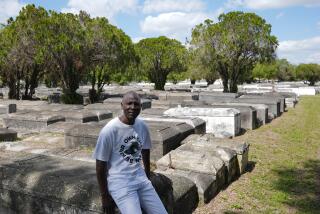Review: ‘The Rape of Recy Taylor’ is a somber, vital tribute to black women in the Jim Crow era
On Sept. 3, 1944, in the small Alabama town of Abbeville, a 24-year-old black sharecropper named Recy Taylor was walking home from an evening church service with two other worshipers when seven white men pulled up in a Chevrolet.
Armed with knives and guns, the men forced Taylor into the back seat and drove to a secluded grove, where six of them gang-raped her for hours before dumping her back on the road where they found her.
“The Rape of Recy Taylor,” Nancy Buirski’s somber and disturbing new documentary, revisits this grave injustice through an evocative weave of testimony, music and film footage of the Jim Crow South. Although the 97-year-old Taylor is seen at strategic moments, her story is largely recounted by her younger siblings, Robert Corbitt and Alma Daniels, who speak with palpable anguish about the horror their sister endured. The longer view is provided by historians and scholars who position the crime within a never-ending cycle of black suffering and resistance that continues to this day.
The suffering, in this case, is no more detailed than it needs to be. It’s revealed that Taylor, who was married and had a 9-month-old daughter at the time of the assault, was violated to a degree that she could no longer bear children afterward. “What they did to her? They didn’t need to live,” Daniels says matter-of-factly. But live they did. Although Hugo Wilson, the driver of the Chevy, confessed to the rape and named the six other men involved, none of them were arrested — an infuriating if unsurprising reminder of the rarity of justice in the segregated South.
Which brings us to the resistance. Taylor’s case came to national attention through the involvement of none other than Rosa Parks, who, more than a decade before refusing to give up her bus seat, worked as an investigator for the National Assn. for the Advancement of Colored People. She went to Abbeville to interview Taylor and find out why there had been no arrests and succeeded in provoking the ire of a local sheriff, Lewey Corbitt. (Taylor’s maiden name was also Corbitt, the movie points out, a vestigial reminder of her family’s past enslavement.)
As she did in “The Loving Story” (2011), her documentary about Richard and Mildred Loving’s 1950s fight against Virginia’s anti-miscegenation laws, Buirski details a public battle for justice that prefigured and ultimately fueled the civil rights era. The 1945 formation of the Committee for Equal Justice made Taylor an early icon of the movement, drawing necessary attention (if not always genuine, meaningful concern) to her case and highlighting the era’s rampant dehumanization of black women.
Based on Danielle L. McGuire’s book “At the Dark End of the Street: Black Women, Rape, and Resistance — A New History of the Civil Rights Movement From Rosa Parks to the Rise of Black Power,” “The Rape of Recy Taylor” becomes a welcome, stirring tribute to black female resilience through the ages. We hear about the women who gathered to hear the Rev. Martin Luther King Jr. speak, their faces beyond the reach of his spotlight, and also the women without whose efforts the Montgomery Bus Boycott would never have happened.
But the movie’s more meaningful accomplishment is to conjure a vision of America before those hard-won milestones. Buirski excerpts vintage race films of the period, movies like Oscar Micheaux’s “Within Our Gates” (1920), whose faded, vital glimpses of everyday black life offer a necessary rebuke to the racist images and attitudes of the time.
Not all the director’s aesthetic choices are as well considered. The civil rights activist Fannie Lou Hamer’s 1963 reworking of “Go Tell It on the Mountain” makes a powerfully vivid inclusion on the soundtrack, but again and again the film recycles Dinah Washington’s performance of “This Bitter Earth,” laid over the seesawing strings of Max Richter’s “On the Nature of Daylight.” It’s a beautiful, haunting mash-up (as anyone who’s seen “Shutter Island” can attest), but more than once it threatens to drown out the testimony of Taylor’s siblings.
Truths this scalding and plain-spoken need no such embellishment to be heard.
------------
‘The Rape of Recy Taylor’
Not rated
Running time: 1 hour, 31 minutes
Playing: Laemmle’s Monica Film Center, Santa Monica
See the most-read stories in Entertainment this hour »
Movie Trailers
UPDATES:
10:40 a.m.: This article was updated to include the title and author of the book on which the documentary is based.
This article was originally published at 1:15 p.m. Dec. 7.
More to Read
Only good movies
Get the Indie Focus newsletter, Mark Olsen's weekly guide to the world of cinema.
You may occasionally receive promotional content from the Los Angeles Times.







